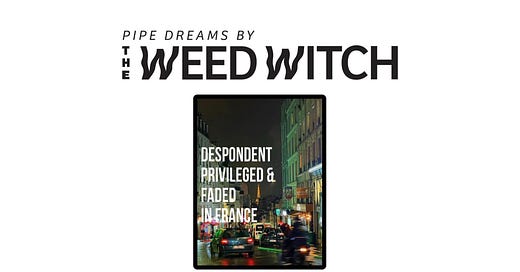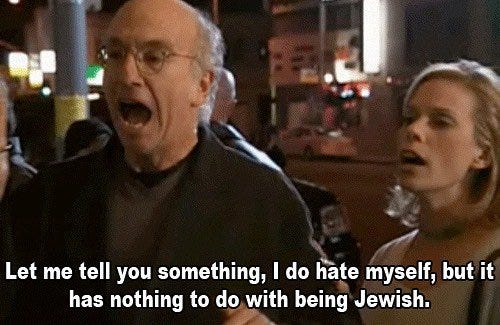Hi readers,
Sorry you haven’t heard from me for a bit. I’ve just returned from fucking off in France, which was both the first international trip I’ve taken since the pandemic and a place I haven’t returned to since my heart was ripped out in 2019.
This trip was inspired by an impulsive purchase of tickets to see Brian Eno’s tour with the Baltic Sea Philharmonic, which only had a few dates scattered around Europe. Eno isn’t only death’s door or anything but he is 75, so it seemed like now was as good a time as ever to plan a whole trip around it. Nine out of every 10 people had no idea who he was, so I just summarized him as “an experimental musician who created the Windows 95 start-up music.”
Because it was my eighth time in Paris, I decided to venture out to Lyon and Annecy, and spent about two hours in Geneva, Switzerland before deciding it was a place that I absolutely hated and have no interest in going back to (though the chocolates are great). Paid subscribers get all of my secrets after the jump because I’m fine with gatekeeping.
Paris is a great place to have your heart broken. You can’t buy that AirBnB experience. It’s still absolutely awful, but if you’re a writer or artist with a sentimental side, you can always try to reframe a present moment of pain as a future content opportunity. “Look at me, I am so heartbroken in France! Life is suffering! Suffering is art! What is love? What is existence? I am going to lose my mind now, bye!” The biggest L I took was not writing about it in the moment because I was too consumed with malaise, but I also knew I would go back. I just didn’t anticipate it would coincide with WWIII.
That period living out of my suitcase has become my personal “Eat Pray Love”—but a little less problematic because I was in Europe and haven’t successfully capitalized on it like Elizabeth Gilbert. I’ve actually never seen that movie or read her book, but from my understanding, it was problematic because a white woman “found herself” by going to Italy and India. I didn’t need Europeans to change me or give me a new perspective as a white Jewish woman; I just needed the headspace and six-hour grace period to find it for myself amongst the people I know, love and hate. How else could I forgive myself and everyone else for the repercussions of my own choices?
I hate that, by the way—having to self-identify with this one-note description as a person as though we are all these fixed entities and representatives of monolithic communities. Being a run-of-the-mill divorcee with an existential crisis like Gilbert is much more relatable, and that is why her book is very successful. Labeling myself as a shorthand “white Jewish woman” or worse, “bisexual queer white neuroatypical neurotic Jewish woman with chronic anxiety and depression disinterested in touching anyone right now” feels so limiting and reductive. It makes me feel like a character in a dystopian hellscape version of the Small, Small World ride at Disneyland.
Maybe it’s because I was indoctrinated to know about the Holocaust or recognize that a diaspora encompasses many, but censuses and fixed personas really freak me out, even though I rely on data for everything and understand they can be helpful metrics tools to better serve people in a positive way and fit needs. That said, data can also be used to make a person feel trapped and hunted. Every once in awhile, I’ll have to update a government form, which reminds me that I can never tell whether being on the grid or off it freaks me out more. I’ve seen both because I’ve always lived on the fringe with one foot in and one out at all times. I know how to blend in, yet at the same time I can’t: I am visible. Other people will label you even if you don’t label yourself. It’s hard not to care about what other people think when they might actually want to kill you.
I thought about this as countries are experiencing record numbers of anti-Semitic and Islamophobic attacks. London police said they had recorded a 1,353% increase in antisemitic offenses this month compared to the same period last year, while Islamophobic offenses were up 140% in the wake of the attack by Hamas on Israel. A woman was stabbed twice at her home in Lyon then had her home marked with a swastika—I place I was in just a week ago while reading about Detroit synagogue president and rabbi Rebecca Woll being murdered on her front doorstep. Palestinean-American Wadea Al Fayoume was stabbed 26 times by his family’s landlord in Chicagoland. Threats of hate crimes have spiked on college campuses where universities are turning a blind eye as students leverage rhetoric straight from the Nazi playbook. There was no one to assure me everything would be OK, so we said nothing.
As a writer whose job is supposed to make people feel comfortable and confident about safe, reliable places to travel and interactions with the world, it has put me in a bit of a bind when I don’t feel that way myself. It’s a lot easier and relatable to talk about revisiting a place with a renewed optimism after experiencing something universal like heartbreak than to alleviate concerns about global warfare. It took a certain amount of self-brainwashing to leave the house, forcing myself to put on rouge and smile for photos just like I did like when I was heartbroken and did not want to. Even then, people were more interested on my opinions about Gaza. I returned no text messages.
If there is anything I’ve learned over the past decade, it’s that there is no “good time” to travel. It could be COVID or the masses descending onto picturesque towns with their COVID revenge travel or dangerous smoke from wildfires or sidestepping around the unhoused populations suffering from addiction or random acts of violence. When would it be better to reschedule? Is there a date when these things end?
I traveled to Maui during the height of the Brett Kavanaugh trials, where after hearing the detailed account of Christine Blasey Ford’s sexual assault to try to prevent a noted rapist from gaining a permanent seat on the Supreme Court governing bodies. While there, I had to attend an all-white dinner with hundreds of cattlemen from the U.S. and Asia that kicked off with a Christian prayer service before a surf and turf dinner on the beach, realizing absolutely no one gave a shit then—and even as reproductive rights are being stripped as we speak, most people still don’t now.
Completely horrified, I texted my cousin and she texted back, “At least you’re in Maui.” Can I really enjoy paradise when I’m living in hell? It’s the question I’ve been going back and forth on about when exactly is a “good” time to go on a trip. How much emotional baggage are you bringing? Because that costs extra now.
Can I really enjoy paradise when I’m living in hell?
So, I decided to go. I like going to France because it’s six hours ahead, but always a little behind. It gives me the time to process the things that move too fast by forcing me to disconnect. To find peace and safety by tending to my raw emotions. Living in the present with fears of the future while conjuring memories of the past requires a conscientious effort to live beautifully with uncertainty. I don’t take much comfort in the Bible—Old or New Testament—but I do take comfort in spirituality. When I don’t have the answers or anyone to tell me it will be OK, it helps to have the reminder that there are others who feel this way, too.
As war broke out and I found myself once again turning to Pema Chodron’s “Living Beautifully with Uncertainty and Change,” and thought a lot about John Horgan’s “Rational Mysticism” that had become cathartic reads during the initial stages of lockdown when I was alone and hadn’t been invited group social pods. When your mind is consumed with existential fear and grief amid so many years of sadness, terror, and uncontrollable forces, you need to remember purpose, function, and that you planned a trip to France a few months ago. You need to go have a good time, for you and everyone else.
All I wanted to do before I went to Paris was write, and as soon as I got there, I just couldn’t do it. Truthfully, the past month has been fucking awful for my overall mental health, and as we all know, writing is a very mental exercise. No one ever accused writers of being particularly stable people, and yet we are expected to always be online and responsive, with our “fingers on the pulse” to stay relevant in everyone’s overly connected minds, even if we’re barely holding on ourselves.
I truly envy the people who have managed to produce anything prolific or even functional right now because I’ve felt physically fucking ill every day for awhile now and I am tired of it. Some writers are partaking in structured writing months—something I actually admire but keep being unable to do myself.
It’s easy to become hardened, jaded, and eroded under the weight of the forces that feel beyond our control. But I’m prone to escapism, which is why I am a food, drug, and travel lifestyle writer. I don’t know if that makes me a good or bad influence, but I certainly try to do my best to have a good time and tell you how to do it, too. Part of that means loving life, and when it all seems like death and despair and utter hopeless, you have to remember to remind yourself of the things you love to not let it consume you entirely. Otherwise, you’ll actually lose your mind.
My good friend David Kelsey who runs a monthly Shabbat at RAKit Club in Ridgewood called Korbanot had a very good anecdote about Big Jews and Little Jews. He ended with: “It takes two hands to tie a knot: a left and a right.” For those of us Little Jews who feel caught in the middle of these two big hands, you’re not alone, even if it feels suffocating. My heart goes out to everyone caught in the crossfire of senseless violence and remain hopeful for peace.
Below is a list and itinerary for being despondent, privileged, and faded in France.
Keep reading with a 7-day free trial
Subscribe to Pipe Dreams By The Weed Witch to keep reading this post and get 7 days of free access to the full post archives.






